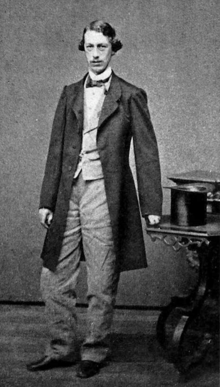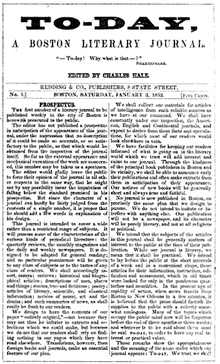Charles Hale

This article deals with the US statesman Charles Hale. For the British MP of the same name, see Charles Leslie Hale.
Charles Hale (1831–1882) of Boston was a legislator in the Massachusetts state House and Senate intermittently between 1855 and 1877. He was house speaker in 1859. In the 1860s he lived in Cairo, Egypt, as the American consul-general. From 1872 to 1873 he worked as United States Assistant Secretary of State under Hamilton Fish.[1]
Biography
Hale was born to Nathan Hale and Sarah Preston Everett. Siblings included Sarah Everett Hale, Nathan Hale Jr., Lucretia Peabody Hale, Edward Everett Hale, Alexander Hale, and Susan Hale.[2]

Charles graduated from Harvard College in 1850; whilst a student he rowed in the Undine Club.[3] He served as class secretary, 1850-1882.[4]
In his early career, Hale worked as a journalist. He founded the short-lived journal To-Day: a Boston Literary Journal in 1852, of which only two volumes were published. He also contributed to his father's paper, the Boston Daily Advertiser, in the 1850s and 1860s. There he started as a reporter after graduation, and was later a junior editor.[2][5] He also contributed to the North American Review and to the Nautical Almanac.[5]
In 1855, Hale was elected to the Massachusetts House of Representatives and was chosen speaker in 1859, up to that time the youngest man ever chosen for the position. He served as U.S. consul-general in Cairo, Egypt, 1864-1870.[6] In Cairo he "arrested the conspirator, John Surratt," suspected of plotting the assassination of Abraham Lincoln.[7]
In 1871, he was elected to the Massachusetts Senate. He was appointed chairman of the committee on railroads, in which capacity he drew up a general railroad act, and was active in securing its enactment.[5] From 1872 to 1873 he worked as Assistant United States Secretary of State, under Hamilton Fish.[1][6] He returned to Boston and was again elected to the state House of Representatives in 1876 and 1877.[2] He was also appointed State Commissioner of Public Lands, responsible for "laying out the Back Bay."[7]
During the latter part of his life he lived in retirement, occupied in literary work, and much of the time was an invalid.[5] He died in 1882. A funeral was held at the South Congregational Church on March 4, at 3pm. "Among those present were Mayor Green, the Hon. Robert R. Bishop, President of the State Senate; the Rev. Edward Everett Hale, and other relatives of the deceased man, and also the Senators and Representatives who served during Mr. Hale's term in the Legislature; the members of the Harvard Class of '50, and the employees of the Boston Daily Advertiser."[8] He is buried in Mount Auburn Cemetery.
References

- ↑ 1.0 1.1 "Hon. Charles Hale, the New Assistant Secretary of State". New York Times. Jan 12, 1872.
- ↑ 2.0 2.1 2.2 Smith College. "Biographical note". Hale Family papers. Retrieved 21 Dec 2009.
- ↑ Harvard Magazine, July 1858.
- ↑ Harvard graduates' magazine (June). 1906. Missing or empty
|title=(help) - ↑ 5.0 5.1 5.2 5.3
 Wilson, James Grant; Fiske, John, eds. (1892). "Hale, John". Appletons' Cyclopædia of American Biography. New York: D. Appleton.
Wilson, James Grant; Fiske, John, eds. (1892). "Hale, John". Appletons' Cyclopædia of American Biography. New York: D. Appleton. - ↑ 6.0 6.1 U.S. Dept. of State, Office of the Historian. "Charles Hale". Retrieved 21 Dec 2009.
- ↑ 7.0 7.1 Harvard College. Class of 1850. Cambridge: John Wilson & Son. 1895.
- ↑ "Funeral of the Hon. Charles Hale". New York Times,. Mar 5, 1882. p. 1.
Further reading
Works by Hale
- To-Day: a Boston Literary Journal. v.1 (January–June, 1852); v.2 (July–December, 1852).
- Nathan Hale, Charles Hale, ed. (1853). Journal of debates and proceedings in the Convention of delegates: chosen to revise the constitution of Massachusetts, begun and holden at Boston, November 15, 1820, and continued by adjournment to January 9, 1821, Reported for the Boston Daily Advertiser. Boston: Pub. at the office of the Daily Advertiser.
- "Our houses are our castles": A review of the proceedings of the Nunnery Committee, of the Massachusetts Legislature; and especially their conduct and that of their associates on the occasion of the visit to the Catholic school in Roxbury, March 26, 1855. Boston: C. Hale, at the office of the Boston Daily Advertiser. 1855.
- Documents in: Papers relating to the foreign relations of the United States. Washington DC: Government Printing Office. 1868.
- "The Khedive and the Court." Atlantic Monthly, May 1876.
- "Municipal Indebtedness." Atlantic Montly, Dec. 1876.
Works about Hale
- Hon. Charles Hale. New York Times, Feb 14, 1872. p. 1.
- Alpha Delta Phi: college secret society in convention. ... Oration by Charles Hale of Boston ... Contrasts Between Egyptian and American Civilization. Other American Visitors to Egypt. Contemporary History of Egypt. The Reign of Ismall Pacha. The Pacha's Dignity. Ismall Pacha's Claim to Statesmanship. Railroad Progress in Egypt. Telegraph Extension. Admirable Systems of Statistics. Boston Daily Globe, Jun 4, 1875. p. 1.
- Dictionary of American Biography. 1879
- The life and letters of Edward Everett Hale. Boston: Little, Brown, 1917
- Letters of Susan Hale. Boston: Marshall Jones company, 1919.
- "Hippopotamus statuette of the Middle Kingdom" (PDF). Bulletin of the Museum of Fine Arts, Boston (Dec.). 1951.
- Karen Sánchez-Eppler. "Practicing For Print: The Hale Children's Manuscript Libraries." Journal of the History of Childhood and Youth, Volume 1, Number 2, Spring 2008.
|